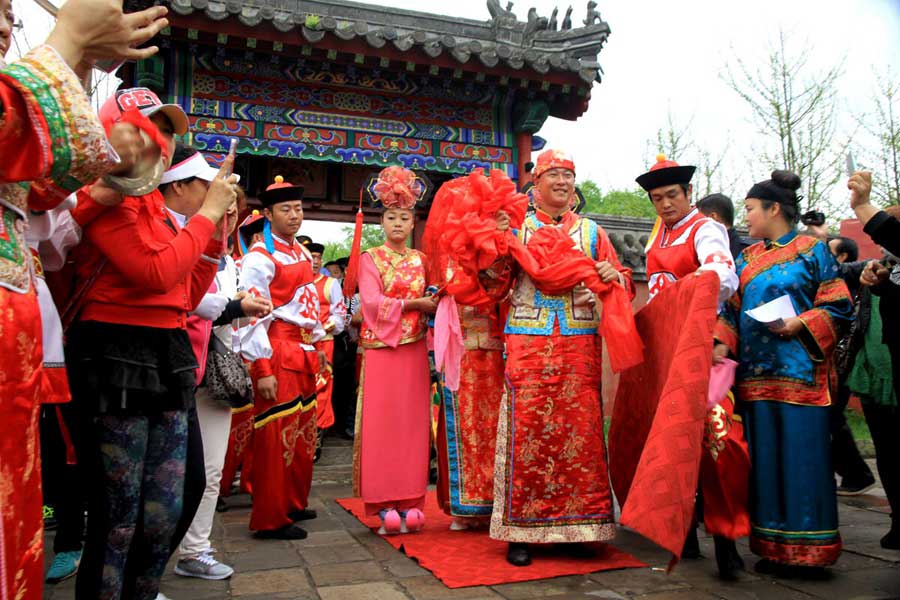Manchu people mainly live in Liaoning, Jilin, and Heilongjiang Provinces, among which most of them live in Liaoning. The population of Manchu is about 10.387 million, ranking in third place among China’s 55 ethnic minorities and after Zhuang and Hui. Manchu has its’ own written and spoken language. The Manchu language belongs to the Altaic family of languages but few people speak Manchu at present. The history of the Manchus has more than two thousand years. They established the last dynasty in the history of China, the Qing Dynasty (1616 – 1911), which left a very rich cultural heritage for the Chinese nation.
Apparel of the Manchu ethnic group
Manchu’s traditional clothes are cheongsam. Both Manchu men and women wear cheongsam. The cheongsam has become a traditional dress for Chinese women in China and around the world. It is called the quintessence of Chinese culture and women’s national dress.
In addition to the cheongsam, the traditional clothes of the Manchus include a mandarin jacket and thousand-floor shoes.
A mandarin jacket is a man’s clothing, a type of short-bottomed jacket. The thousand-floor shoes were often worn at home by both Manchu men and women.
Food and Drink
The traditional staple food of the Manchus includes: stop palpitation, cooking cakes (dumplings), rice, sorghum rice (Humi), dried rice with bean card, bean cake, sour soup, etc. They especially like to eat sticky food and sweet food, such as cakes, rice cakes, and so on. Nowadays we consider “donkey rolling” and “Sakima” as Manchu traditional snacks. Chafing dishes, whole lamb mat, and sauced meat are also traditional ways of preparing meat for the Manchus. Sauerkraut is one of their favorite vegetarian dish, stir-fried, stewed, or salad.
Traditional Festivals
Many Manchu festivals are influenced by the Han people, and today they celebrate some traditional festivals of Han culture, such as the Spring Festival, the Lantern Festival, the February 2nd, the Dragon Boat Festival, and the Mid-Autumn Festival. During the festivals, traditional sports activities such as pearl ball, vaulting horse, jumping camel and skating are usually held. The traditional festival of Manchu is the Golden Festival.
Golden Festival is the day of Manchu’s “National Festival”. On the 13th day of the 1635 lunar calendar, the first emperor of the Qing Dynasty, Huang Tai Chi, issued an edict to officially change the name of “Nvzhen” to “Manchuria”, which marked the formation of a new national community. On the 13th day of October, the naming day of the Manchus was held spontaneously to commemorate the birth of the Manchus. But the ways of calling the event are not the same; “named day”, “birthday”, or “anniversary”, and so on.
Religions of the Manchu ethnic group
Manchus believe in Shamanism and Buddhism.
Shamanism is the ultimate religion of the Manchus. Shamanism holds that all things have spirit, and Shaman is the emissary of spiritual communication. The gods of worship include natural god (such as mountain god), animal god (such as horse king), ancestor god, and human god (such as Guan Di). Although the Manchus believed in Buddhism, the sacrifice of the shamans was not abandoned.
Manchu believed in Buddhism. Due to historical reasons, in the Qing Dynasty, the Mongolians were only inferior to the Manchus, and the Manchus were allowed to intermarry with Mongolian. Therefore, the Tibetan Buddhism (Lamaism) of the Mongolian faith soon spread to Manchu. In addition, the Han Buddhism also had an effect on the Manchu. Most Manchus believers practiced Buddhism at home rather than being monks in temples.
Taboos of the Manchu ethnic group
Manchu people do not eat dog meat or wear clothes made of dog skin. The Manchus took the western wall as the sacred, holy place to worship their ancestors Where clothes and New Year pictures are not allowed to post. Bed in the West was popularly known as the “Buddha Bed”, for placing memorial tablets (for ancestral worship). Usually, guests are not allowed to rest on the bed in the west, let alone put on a dog skin hat or whip here.

